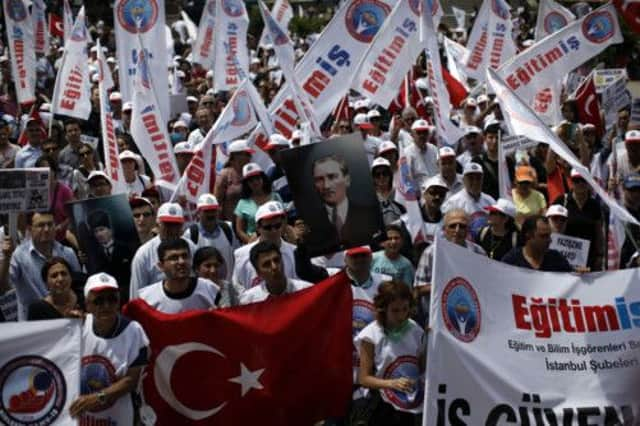Turkey: Protesters set out demands to end clashes


Deputy prime minister Bulent Arinc yesterday met a group whose attempt to prevent authorities from ripping up trees in the landmark square has snowballed into nationwide protests against what demonstrators see as prime minister Recep Tayyip Erdogan’s increasingly authoritarian rule.
Police have fired water cannons and tear-gas canisters at protesters in several Turkish cities. The Ankara-based Human Rights Association said almost 1,000 people have been injured and more than 3,300 detained during five days of protests.
Advertisement
Hide AdAdvertisement
Hide AdThe activist group denounced Mr Erdogan’s “vexing” style and urged the government to halt plans to redevelop Taksim Square, ban the use of tear gas by police, immediately release detained protesters and lift restrictions on freedom of expression and assembly.
It also demanded officials responsible for the violent crackdown be removed from office.
The protests appear to have developed spontaneously. It was not at all certain that protesters would heed any call to clear the streets.
The group of academics, architects and environmentalists, known as the “Taksim Solidarity Platform,” was formed to try to save Taksim Square from redevelopment, including the rebuilding of an Ottoman army barracks and a shopping mall. The protests were sparked by fury over a heavy-handed pre-dawn police raid last Friday to remove activists camping out in a bid to stop the development.
Protests appeared to calm slightly yesterday, even as thousands of trade union members on a two-day strike marched to Taksim, and into the centre of the capital, Ankara.
Some demonstrations were jovial. In Ankara, protesters sarcastically called themselves “looters,” a reference to Mr Erdogan’s earlier description of them. A sign on a stall in Taksim providing free food and water read, “Revolution Market”.
Deputy premier Mr Arinc, who is standing in for Mr Erdogan while he is on a trip to North Africa, has offered an olive branch to protesters, apologising for what he said was a “wrong and unjust” crackdown on the sit-in. Mr Erdogan had inflamed protesters, calling them an extremist fringe, and refusing to back away from plans to revamp Taksim.
“The steps the government takes from now on will define the course of society’s reaction,” Eyup Muhcu, head of a chamber of architects, told reporters after meeting Mr Arinc.
Advertisement
Hide AdAdvertisement
Hide AdIn Turkey’s third largest city, Izmir, police have detained 25 people for “spreading untrue information” on social media and allegedly inciting people to join the protests.
“I have looked at [their] files and examined the tweets,” the Radikal newspaper quoted lawyer Sevda Erdan Kilic as saying. “There is nothing there to provoke the people [into rioting]. They are sentiments that we all share.”
Turkey’s main broadcast media have been criticised for shunning the coverage of police brutality at the protest’s onset. Many people turned to social media to keep up to date. Mr Erdogan himself has condemned social media as “the worst menace to society”.
Analysis by Sebnem Kalemli-Ozcan: Impressive short-term economic growth does not a robust European-style democracy make
Turkey’s economy has been booming for a decade. Why, then, have peaceful demonstrations that began in Istanbul’s Taksim Square turned into a nationwide protest movement, with hundreds of thousands taking to the streets in opposition to prime minister Recep Tayyip Erdogan’s government?
He has been praised for his economic policies, which have led to a higher growth rate. But the question is whether a developing country like Turkey can sustain rapid growth if the same government is undermining basic liberties and impeding the advance of key institutions needed for long-term success.
Institutions embody and reinforce a society’s rules. They consist of informal constraints (traditions and cultural norms) and formal rules (constitutions, laws, and regulations). They structure an economy. Turkey still lacks the institutions critical for long-term progress. Its International Country Risk Guide score – an index that measures the quality of a country’s institutions – is one of the lowest of any nation within the Organisation for Economic Co-operation and Development. Turkey also ranks last in the OECD’s Better Life Index. Only 31 per cent of adults aged 25-64 have completed secondary school; inequality is dangerously high; and more journalists are imprisoned in Turkey than in any other country. The 2013 report by the democracy watchdog Freedom House indicates civil liberties in Turkey are under threat.
In recent years, much research has investigated how culture can constrain institutions. Turkey has a rather conservative, Muslim majority culture. The question is: can it create the conditions for sustainable growth?
Advertisement
Hide AdAdvertisement
Hide AdTurkey’s success, in terms of growth, is impressive. Prudent monetary and fiscal policies, a clean-up of the banks after the 2000-01 crisis, and investment in infrastructure played a part. These policies set in motion a process of transitional/catch-up growth, with Turkey steadily closing the income gap vis-à-vis rich countries.
But long-term success requires strong institutions, including protection of property rights and civil liberties. This, in turn, will help to realise investments in education – especially for women – and technology, together with structural reforms, all of which have been highlighted as areas of concern in studies of Turkey. The fear is that Turkey has boosted short-term growth that will run out of steam if not properly augmented.
Whether or not Turkey is a long-run development success remains to be seen. The indicators so far are not very favourable. The recent events in Taksim Square and other Turkish cities are a stark reminder of its still-weak institutional infrastructure. People are still in the streets – and seem in no hurry to go home. I hear them chanting as I write: “Democracy without liberty is no democracy.”
• Sebnem Kalemli-Ozcan is senior resident scholar at the International Monetary Fund.